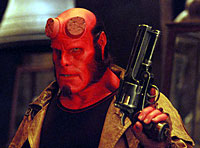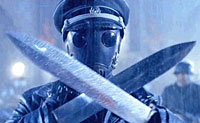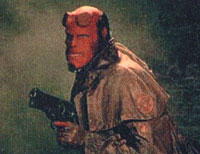>> Comment: A Shot Of MoCCA
>> Comment: He Could Be Wrong, He Could Be Wright
More...

 Director: Guillermo del Toro
Director: Guillermo del Toro
Starring: Ron Perlman, Selma Blair, Rupert Evans
Based on comic book series created by Mike Mignola
Distributors: Sony Pictures/Columbia Pictures
In a panel discussion at the 2002 San Diego Comic-Con, Guillermo del Toro laid HELLBOY fans' fears to rest when he said; "I'm doing this movie only because I'm desperately in love with the comic, not because I want to change it or make it better. I think that when you know of something good, you want to build a world around it. You want to, if possible, poke your dick into it."
For del Toro, the best way to act out on this euphemism was to include Mike Mignola in every step of the production of the HELLBOY film. To that end, whatever one might think of del Toro's interpretation, it must be tempered with the knowledge that this was the 'officially licensed' adaptation.
One thing del Toro certainly got right was that HELLBOY is a pure example of nature versus nurture. His being raised by Professor Bruttenholm in the safety of the Bureau of Paranormal Research and Development allowed him to not fulfil any pre-existing prophecies about his being the beast of the apocalypse.
Mignola's Hellboy brushed all of this off as stupid, but that hasn't stopped him from pursuing the truth of the matter. It isn't so much Hellboy's humanity that has stopped him calling about the end of the world, but that he's chosen not to do it because it's something he'd just rather not do.
In the film, Hellboy chooses not to unleash the end of the world because of his feelings towards Liz Sherman. Which is cool, and all, but it somehow alters the concept of Hellboy that this reviewer walked into the movie with. Mignola had always hinted around the relationship between Hellboy and Liz, but has never taken the time to explore it. Hellboy always seemed to have too much on his plate for that. Not that it's a bad thing - everyone needs a little bit of love - but hinging the destruction of the world on the love between a demon and a human is a tricky proposition.
 To that end, del Toro's Hellboy is much more volatile and adolescent. The purist in me finds the amplification of the love story tiresome and unnecessary, but the more that I look into it, the scarier the concept makes things. While del Toro's vision of Hellboy is faithful to Mignola's, he's managed to produce a much more childlike version of Hellboy, and thus a much more unpredictable Hellboy.
To that end, del Toro's Hellboy is much more volatile and adolescent. The purist in me finds the amplification of the love story tiresome and unnecessary, but the more that I look into it, the scarier the concept makes things. While del Toro's vision of Hellboy is faithful to Mignola's, he's managed to produce a much more childlike version of Hellboy, and thus a much more unpredictable Hellboy.
There's also a lot of discussion of Hellboy's name in the movie. He's Hellboy and HB and Red and (of course) Anung Un Rama. There seems to be an overwhelming urge to explain and examine what Mignola threw out as a joke. Why is he named Hellboy? What does it mean to be named Hellboy? What would an adult demon named Hellboy be concerned with? Getting laid, apparently.
This puts Hellboy in the same category as just about every monster, alien and freak on the silver screen: they all want human women. Perhaps it's just a part of translating HELLBOY from comic to film that certain genre elements need to be added or amplified.
The same apparently goes for Kroenen. The movie perfectly captured Kroenen's fierce visage and also sets about explaining him a bit more. While in the comics he was little more than a side-character, del Toro gives him more of the spotlight - at the expense of a deeper exploration of Rasputin and Ilsa Haupstein. Mignola, by comparison, is endlessly fascinated with Rasputin and Ilsa - each character continually resurfaces in different forms (ghost, iron maiden, trapped in a nut). Mignola also got rid of Professor Bruttenholm before properly explaining his importance. Del Toro gives Bruttenholm more exposure, and like Kroenen, this is a welcome amplification.
Then there's Abe Sapien, without a doubt the heart of the film. While Ron Perlman's Hellboy is spot-on, from the "oh crap" to the filed-down horns, it's the subtlety of Abe's characterisation that best shows how Mignola's storytelling has come into play in the film. Beyond the fact that he was discovered in a tube in the basement of a hospital, there's not much known about Abe. Yet his motives are so clearly pure that there's never any question about where his allegiance stands.
 One thing Mignola does gloriously wrong is that he fills the pages of HELLBOY with too many characters. Take, for instance, the opening scene of SEED OF DESTRUCTION, wherein two giant casts of characters gather at two different locations. Many of these characters are never heard from again - Torch of Liberty anyone? But Mignola and scriptwriter John Byrne were clearly having so much fun with HELLBOY that they chose to populate his universe with as many wildly imaginative characters as possible, even before throwing in a baby demon from Hell.
One thing Mignola does gloriously wrong is that he fills the pages of HELLBOY with too many characters. Take, for instance, the opening scene of SEED OF DESTRUCTION, wherein two giant casts of characters gather at two different locations. Many of these characters are never heard from again - Torch of Liberty anyone? But Mignola and scriptwriter John Byrne were clearly having so much fun with HELLBOY that they chose to populate his universe with as many wildly imaginative characters as possible, even before throwing in a baby demon from Hell.
Of course, Mignola already had quite a playground to dabble in. Despite the dizzying introduction, SEEDS OF DESTRUCTION soon ventures deep into occult mythology, and many of the finer HELLBOY stories plug Hellboy into pre-existing myths. The film hardly scratches the surface of this world. I know, I know, we'll have to wait for the sequel.
The origin story is the most essential part of the adaptation. As exciting as it is to see Hellboy jumping around and punching things, the origin defines the story. Del Toro chose to compress the origin by placing Professor Bruttenholm and Sgt Whitman in the wings at Project Ragna Rok. The subsequent chaos and the rescue of baby Hellboy was some of the daffiest stuff I've seen in a big budget film in some time, and while it dabbled with material I was familiar with, the landscape had changed enough that I was excited to see how this interpretation would stand up. And I think it works.
In fact, as a whole, I think the movie works. Del Toro has created a story that stands squarely alongside Mignola's works, and provides something to measure Mignola's future stories against - if only Mignola would get back to work.
Frank Smith has created a HELLBOY timeline for Ugo.com's Introduction To Hellboy. That said, as much as I love seeing movies about characters I'm familiar with from other media, there's always something overly earnest about the on-screen interpretations that makes me uneasy. In reading the comics, I've never once needed to have the basis for Hellboy's name explained. In a medium filled with people whose names are never-ending variations on 'superlative' plus 'gender', perhaps that makes the comic audience a bit better attuned to a name like 'Hellboy' than your average popcorn-chewing movie audience.
But that attitude is really the essence of what Hellboy is about. HELLBOY takes a blend of mythology, occult, pulp novels and comic books, and treats it all with respect - but never takes any of it too seriously.

This article is Ideological Freeware. The author grants permission for its reproduction and redistribution by private individuals on condition that the author and source of the article are clearly shown, no charge is made, and the whole article is reproduced intact, including this notice.


